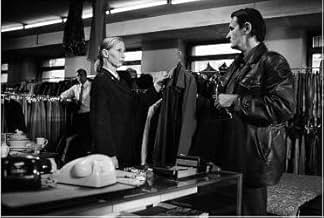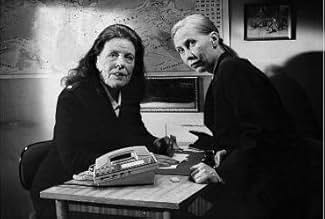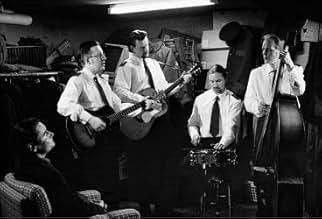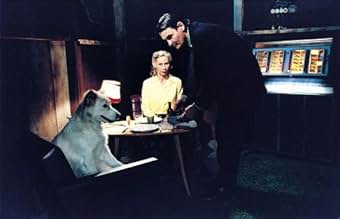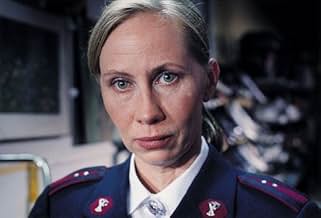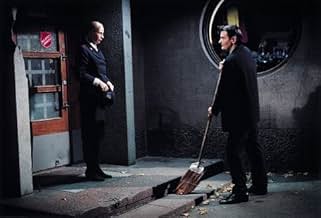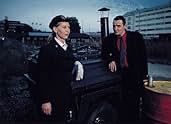VALUTAZIONE IMDb
7,6/10
28.005
LA TUA VALUTAZIONE
M arriva ad Helsinki solo per essere brutalmente aggredito da delinquenti e dichiarato morto dai medici. Rianima ma senza alcun ricordo del suo passato o della sua identità. Ricostruisce la ... Leggi tuttoM arriva ad Helsinki solo per essere brutalmente aggredito da delinquenti e dichiarato morto dai medici. Rianima ma senza alcun ricordo del suo passato o della sua identità. Ricostruisce la sua vita da zero, ma il passato lo raggiunge.M arriva ad Helsinki solo per essere brutalmente aggredito da delinquenti e dichiarato morto dai medici. Rianima ma senza alcun ricordo del suo passato o della sua identità. Ricostruisce la sua vita da zero, ma il passato lo raggiunge.
- Regia
- Sceneggiatura
- Star
- Candidato a 1 Oscar
- 21 vittorie e 27 candidature totali
Recensioni in evidenza
This Finnish film may not be for everyone. Though nominated in 2002 for an Oscar for best foreign film, I don't think it got much play in the US. It's a quiet movie about a guy who is beaten in a park in Helsinki right after getting off a train. The hospital thinks he's dead, but he staggers out, gradually recovers, and can't remember a thing. He meets a number of people, most of whom help him in some way or another. He meets a Salvation Army woman and a relationship develops.
It's hard to describe this movie. The dialogue is often funny, but delivered absolutely deadpan. There is no excitement, but a rich development of story and relationships through incidents that happen to the lead character or that he causes to happen. The two leads, Markku Peltoa and Kati Outinen, are adults and look it. There's no Hollywood handsomeness about either of them. The structure of the movie is a gem of economy. One scene ends and the film moves briskly on to the next scene. No extended, unnecessary character development. No superfluous dialogue. It may sound pompous, but this movies creates at the end a nice feeling of mature contentment.
It's hard to describe this movie. The dialogue is often funny, but delivered absolutely deadpan. There is no excitement, but a rich development of story and relationships through incidents that happen to the lead character or that he causes to happen. The two leads, Markku Peltoa and Kati Outinen, are adults and look it. There's no Hollywood handsomeness about either of them. The structure of the movie is a gem of economy. One scene ends and the film moves briskly on to the next scene. No extended, unnecessary character development. No superfluous dialogue. It may sound pompous, but this movies creates at the end a nice feeling of mature contentment.
I've watched this twice now, and throughly enjoyed both viewings, finding this film to really be a unique one. It's a Finnish film, which is unusual to start with, at least here in the U.S. because we don't see too many films from Finland. It's a black comedy, meaning deadpan looks with subtle comedic lines. In English, it's titled "The Man Without A Past."
The main actor, Markuu Peltola, is perfect for this movie with one of the most deadpan faces you'll ever see. He is amazing to watch and Kati Outinen, as his love interest, is similarly strange and fascinating. Part of their charm are their unusual looks. This is not a romance between people who look like your normal handsome film stars.
Simply, this is just something very different from anything you've seen, a combination of drama, comedy and romance with some of the strangest dialog I've ever heard on film. If you appreciate dry humor and a bizarre but touching story, you should see this.
The main actor, Markuu Peltola, is perfect for this movie with one of the most deadpan faces you'll ever see. He is amazing to watch and Kati Outinen, as his love interest, is similarly strange and fascinating. Part of their charm are their unusual looks. This is not a romance between people who look like your normal handsome film stars.
Simply, this is just something very different from anything you've seen, a combination of drama, comedy and romance with some of the strangest dialog I've ever heard on film. If you appreciate dry humor and a bizarre but touching story, you should see this.
I am not familiar at all with the work of this director at all so I was unsure what to expect from this movie when seeing it as part of the Regus London Film Festival on tour.
I needn't have worried. This film is very touching and in many places laugh out loud funny. The scene where the dog is introduced is just side-splitting.
The humour is so dry and it is very hard to compare this film with many other films, but for some reason it reminded me a little of Jean-Pierre Jeunet's Delicatessen, especially some of the colours in the set design.
I understand this film is the second part of a trilogy? I simply have to see more stuff from this guy, I feel like I have missed out in a big, big way!
If you get the chance, don't hesitate to see this film, it is simply a work of art. I for one will be going to see it again when it goes on general release next year.
I needn't have worried. This film is very touching and in many places laugh out loud funny. The scene where the dog is introduced is just side-splitting.
The humour is so dry and it is very hard to compare this film with many other films, but for some reason it reminded me a little of Jean-Pierre Jeunet's Delicatessen, especially some of the colours in the set design.
I understand this film is the second part of a trilogy? I simply have to see more stuff from this guy, I feel like I have missed out in a big, big way!
If you get the chance, don't hesitate to see this film, it is simply a work of art. I for one will be going to see it again when it goes on general release next year.
The Man Without a Past, the second installment in Aki Kaurismäki's "losers" trilogy (the first being 1996's Drifting Clouds), is, to date, the only Finnish film to have received a Best Foreign Language Film Oscar nomination, and deservedly so. It's a wonderful, heartbreaking opus, and arguably Kaurismäki's finest movie.
At the story's center we find a nameless man (Markku Peltola), who arrives in Helsinki for unknown reasons. That same night, he's brutally assaulted by a group of punks. This incident makes him look dead, although we immediately learn he is alive, if completely amnesiac. With no idea of who he is or what he's supposed to do, he starts looking for a home and an employment. He manages to rent a "house" in the city outskirts (don't miss Sakari Kuosmanen as the landlord) and befriends Irma (Kati Outinen), a social worker who tries to help M (in lack of a better name, and given "X" is quite overused) as much as possible. It is this friendship, which slowly evolves into something deeper, that truly motivates the protagonist in his pursuit of a better life.
The Man Without a Past strikes us because, unlike other films involving amnesia, it makes us hope M won't recover his memory: what he experiences throughout the movie, the people he meets, that's what really matters. It's a little bit like a road movie (they never end with the characters reaching their destination), only this time the voyage involves the mind and the spirit. It's a similar voyage the director asks the audience to join, as he artfully explores human life and its chances of improvement.
Moving and reminiscent of Italian neorealism (De Sica, Rossellini, Visconti), The Man Without a Past is a flawless reflection on how happiness is to be found anywhere, no matter the circumstances.
At the story's center we find a nameless man (Markku Peltola), who arrives in Helsinki for unknown reasons. That same night, he's brutally assaulted by a group of punks. This incident makes him look dead, although we immediately learn he is alive, if completely amnesiac. With no idea of who he is or what he's supposed to do, he starts looking for a home and an employment. He manages to rent a "house" in the city outskirts (don't miss Sakari Kuosmanen as the landlord) and befriends Irma (Kati Outinen), a social worker who tries to help M (in lack of a better name, and given "X" is quite overused) as much as possible. It is this friendship, which slowly evolves into something deeper, that truly motivates the protagonist in his pursuit of a better life.
The Man Without a Past strikes us because, unlike other films involving amnesia, it makes us hope M won't recover his memory: what he experiences throughout the movie, the people he meets, that's what really matters. It's a little bit like a road movie (they never end with the characters reaching their destination), only this time the voyage involves the mind and the spirit. It's a similar voyage the director asks the audience to join, as he artfully explores human life and its chances of improvement.
Moving and reminiscent of Italian neorealism (De Sica, Rossellini, Visconti), The Man Without a Past is a flawless reflection on how happiness is to be found anywhere, no matter the circumstances.
Herzog introduced me to the tension created by moving back and forth from highly styled scenes to realistic ones in syncopated steps. It has an extraordinary effect; I do not know who first devised this technique, but it matters.
Sometimes, you will see it adding value on the real side. Rarely is it ever used this way, to multiply anchor a minimalist sketch of fate. Jarmusch does this, perhaps being the master, but this is pretty clean, novel and effective as well. Its because Fins are inherently minimalist in a particularly overt way. Stylized in a stylized way, perhaps to stand above its neighbors who value cleanliness but only after passing through terminal sophistication.
There is a sweet purity to this man we see, and the man we do not who made the thing. There is an honor in just getting up in the morning. The people here are either honest and generous — even the local cop who exploits the poor — or crippled participants in the machine. Everyone with a conventional job is in this latter class.
Just as with most Jarmusch, music and the enrichment it brings, is woven into the story as an intrinsic element. The music itself is highly stylized, and like the film is an abstraction of deep, rich emotion. It is played here by a Slavation Army band our hero brings to musical salvation. The love story matters I think, because it depends on nothing other than simple need and directness.
Ted's Evaluation -- 3 of 3: Worth watching.
Sometimes, you will see it adding value on the real side. Rarely is it ever used this way, to multiply anchor a minimalist sketch of fate. Jarmusch does this, perhaps being the master, but this is pretty clean, novel and effective as well. Its because Fins are inherently minimalist in a particularly overt way. Stylized in a stylized way, perhaps to stand above its neighbors who value cleanliness but only after passing through terminal sophistication.
There is a sweet purity to this man we see, and the man we do not who made the thing. There is an honor in just getting up in the morning. The people here are either honest and generous — even the local cop who exploits the poor — or crippled participants in the machine. Everyone with a conventional job is in this latter class.
Just as with most Jarmusch, music and the enrichment it brings, is woven into the story as an intrinsic element. The music itself is highly stylized, and like the film is an abstraction of deep, rich emotion. It is played here by a Slavation Army band our hero brings to musical salvation. The love story matters I think, because it depends on nothing other than simple need and directness.
Ted's Evaluation -- 3 of 3: Worth watching.
Lo sapevi?
- QuizIn the bar scene there is a portrait photo of Matti Pellonpää on the wall. He played in numerous Kaurismäki films before his sudden death in 1995.
- BlooperThe Helsinki railway station's extension roof is clearly visible at the opening scene, but it hadn't been built yet in 1996 (the year can be read from the newspaper).
- ConnessioniFeatured in Matka suomalaiseen elokuvaan: Naurua pimeässä (2006)
- Colonne sonoreDo The Shake
Performed by The Renegades
Music & Lyrics by Brown / Gibson / Johnson / Mallett
Published by Warner / Chappell Music Finland
(P) 1964 Scandia / Warner Music Finland
Licensed courtesy of Warner Music Finland
I più visti
Accedi per valutare e creare un elenco di titoli salvati per ottenere consigli personalizzati
- How long is The Man Without a Past?Powered by Alexa
Dettagli
- Data di uscita
- Paesi di origine
- Siti ufficiali
- Lingua
- Celebre anche come
- The Man Without a Past
- Luoghi delle riprese
- Aziende produttrici
- Vedi altri crediti dell’azienda su IMDbPro
Botteghino
- Budget
- 8.000.000 FIM (previsto)
- Lordo Stati Uniti e Canada
- 921.847 USD
- Fine settimana di apertura Stati Uniti e Canada
- 23.281 USD
- 6 apr 2003
- Lordo in tutto il mondo
- 9.564.237 USD
- Tempo di esecuzione1 ora 37 minuti
- Colore
- Mix di suoni
- Proporzioni
- 1.85 : 1
Contribuisci a questa pagina
Suggerisci una modifica o aggiungi i contenuti mancanti

Divario superiore
What is the Canadian French language plot outline for L'uomo senza passato (2002)?
Rispondi





